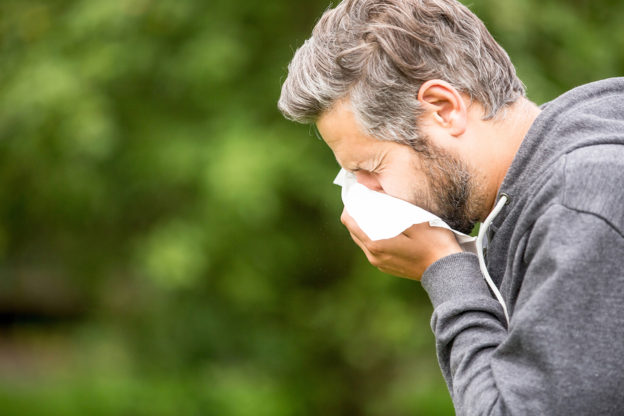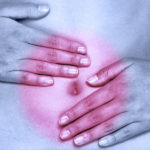By David Blyweiss, M.D., Advanced Natural Wellness
May 14, 2018
- Is depression an allergic reaction?
- Why do you have seasonal allergies in the first place?
- My 3-pronged treatment to overcome allergies and depression
Spring allergy season is still in full bloom in some areas of the U.S., leaving some folks sneezing, sniffling and feeling miserable. However, seasonal allergies aren’t restricted to springtime. They can also occur in summer and early fall. And some people suffer from hay fever year round.
Regardless of which category you fall in, those allergy symptoms may come with an unwanted side effect…
Allergy patients often report higher levels of general fatigue and reduced motivation. Some say they feel depressed or moody. Others tend to develop high levels of anxiety.
You might think that the simple annoyance of a runny nose, nasal obstruction and sneezing are responsible for these negative emotional aspects of allergies. And in some cases that’s probably true.
But if you have allergies, there may be other things going on in your body that can intensify these emotional issues.
Open your arteries, improve blood flow for a new health miracle...
Did you know your circulatory system has over 60,000 miles of arteries, veins and other blood vessels, if stretched end to end?
But as you age, your blood vessels undergo changes, which may cause them to stiffen, thicken and get clogged.
GOOD NEWS! Doctors have now identified a “Miracle Molecule” inside your arteries that helps OPEN your arteries and IMPROVE blood flow.
It’s what Dr. Valentin Fuster calls it, "One of the most important discoveries in the history of cardiovascular medicine."To you, that means...
- Healthy blood pressure
- Sharper mind and memory
- Skyrocketing energy and muscular strength
- Increased pleasure and passion in the bedroom
- Improved circulation to every cell and organ in your body
Go here to discover a new natural way to significantly boost the levels of this miracle molecule in YOUR body NOW!
Why do you have Allergies in the First Place?
One of the first things my allergy patients ask me is “Why do I have allergies in the first place?”
In a nutshell, allergies occur when your immune system mistakenly interprets airborne particles of pollen, mold, or dust as dangerous invaders. Your body overreacts and releases a chemical called histamine into the bloodstream. It’s this histamine release that causes all of your symptoms.
While this makes sense to most of my patients, many of them also complain about the way they feel. Feelings of melancholy and general malaise are quite common.
Well, there’s a reason for that too.
You see, allergies also trigger the release of pro-inflammatory cytokines. These proteins are involved in all sorts of brain regulation, including mood. And they are often found at high levels in people suffering from depression, anxiety and other mood disorders.
In other words, it may not be your allergic symptoms sending you on a downward emotional spiral. Rather, it’s the abundance of cytokines thrown off by your immune response that affects your emotional well-being.
The World's Quickest Solution for Ending Prostate and Urinary Misery
This has recently been revealed to be one of the only real breakthroughs in prostate health.
The seeds of a strange fruit (sometimes called "Chinese Apples") hold powerful phytonutrients that are a revolution in prostate health.
In fact, UCLA and Veterans Administration research have now proved this to be true.
Not only that, but it may be the worlds quickest solution for ending prostate misery.
Simply stated, these phytonutrients represent a huge step beyond beta sitosterol, saw palmetto, and other phytosterols alone.
Simply click HERE if you want to have fast prostate relief...restful, uninterrupted sleep...no more constant "urges to go"...enhanced virility...and optimal prostate support for life.
Taken together, this means three things need to happen to relieve your allergy symptoms, stop them from happening in the first place, and alleviate any associated mood or emotional problems associated with them.
My 3-Pronged Treatment to Overcome Allergies and Depression
Allergies aren’t always easy to treat. But there are several things you can do immediately to protect yourself from allergic symptoms, reduce their occurrence and side-step the mood disorders that often accompany them.
This includes reducing histamine levels, boosting your immune response and decreasing levels of pro-inflammatory cytokines. Here’s what I recommend…
Reduce Histamine Production:
- Stinging Nettle contains anti-allergenic and antihistamine compounds. These compounds enhance the body’s resistance to pollens and molds. Dose: Always use the lowest dose available when symptoms arise. You can dose to effect, usually 300-500 mg. two to three times a day. Choose freeze-dried nettle leaf powder extracts for maximum effectiveness.
- Butterbur is a must-have during allergy season. Research shows it’s just as effective as Zyrtec and Allegra, but without any drowsy side effects. Standardized tablets usually contain 50-100 mg. and twice a day should do the trick. As always, start with the lowest dose.
- Quercetin inhibits the release of histamine in response to allergies. You can find it in foods like onions and garlic. But you can’t really get the amount you need in these foods. So add a supplement of 200 to 500 twice a day with meals. Look for supplements that also contain bromelain to improve absorption.
Add these Super Immune Boosters:
- N-Acetyl Cysteine (NAC.) Research indicates allergy sufferers tend to have lower antioxidant levels and higher levels of damaging oxidative stress. NAC boosts your body’s natural production of a powerful antioxidant called glutathione. Glutathione is absolutely essential for your immune health and your number one defender against oxidative stress. Try 600 mg. twice
- Spirulina is a form of algae that’s filled with protein, phytonutrients, antioxidants and B-vitamins. It’s a proven immune booster and can also reduce allergy symptoms. During allergy season it can help reduce nasal discharge, sneezing, nasal congestion and itching. I suggest 2,000 mg. daily.
- Vitamin C has potent antioxidant activity. It can strengthen your immune system and protect your cells from free oxidative stress when your allergies kick up. Take 2,000 to 3,000 mg twice daily.
Shut Down Inflammation:
- The foods you eat can go a long way in shutting down inflammation. I recommend a variety of fresh, organic fruits, vegetables and healthy fats. At the top of the list are leafy greens, berries, grapes, green tea, olive oil, wild-caught fish along with plenty of herbs and spices.
- In particular, the Indian spice turmeric (curcumin) is known to actively reduce pro-inflammatory cytokines. It also works well to relieve symptoms of depression. You can add fresh turmeric to your foods, or look for a curcumin supplement that contains 95% curcuminoids and at least 10 mg of bioperine.
SOURCES:
Sansone RA, et al. Allergic Rhinitis: Relationships with Anxiety and Mood Syndromes. Innov Clin Neurosci. 2011 Jul; 8(7): 12–17.
Farooq RK, et al. Role of inflammatory cytokines in depression: Focus on interleukin-1β. Biomed Rep. 2017 Jan; 6(1): 15–20.
Felger JC, et al. Inflammatory Cytokines in Depression: Neurobiological Mechanisms and Therapeutic Implications. Neuroscience. 2013 Aug 29; 246: 199–229.
Salim S, et al. Inflammation in anxiety. Adv Protein Chem Struct Biol. 2012;88:1-25.
Roschek B Jr. Nettle extract (Urtica dioica) affects key receptors and enzymes associated with allergic rhinitis. Phytotherapy Research. 2009;23:920-926.
Schapowal A. Treating intermittent allergic rhinitis: a prospective, randomized, placebo and antihistamine-controlled study of Butterbur extract Ze 339. Phytotherapy Research. 2005;19:530-537.
Schapowal A; Petasites Study Group. Randomised controlled trial of butterbur and cetirizine for treating seasonal allergic rhinitis. BMJ. 2002 Jan 19;324(7330):144-6.
Cingi C, Conk-Dalay M, Cakli H, Bal C. The effects of spirulina on allergic rhinitis. Eur Arch Otorhinolaryngol. 2008 Oct;265(10):1219-23.
Bucca C. Effect of vitamin C on histamine bronchial responsiveness of patients with allergic rhinitis. Annals of Allergy. 1990;65:311-314.
Derosa G, et al. Effect of curcumin on circulating interleukin-6 concentrations: A systematic review and meta-analysis of randomized controlled trials. Pharmacol Res. 2016 Sep;111:394-404.







